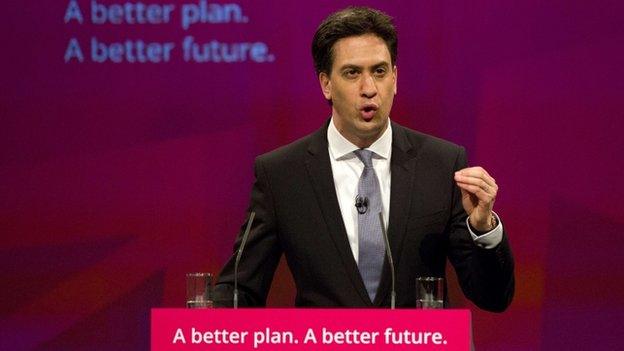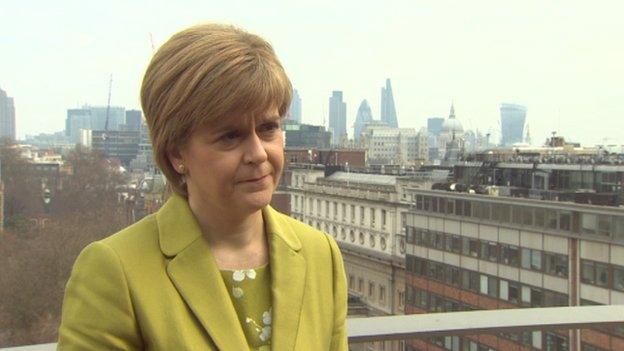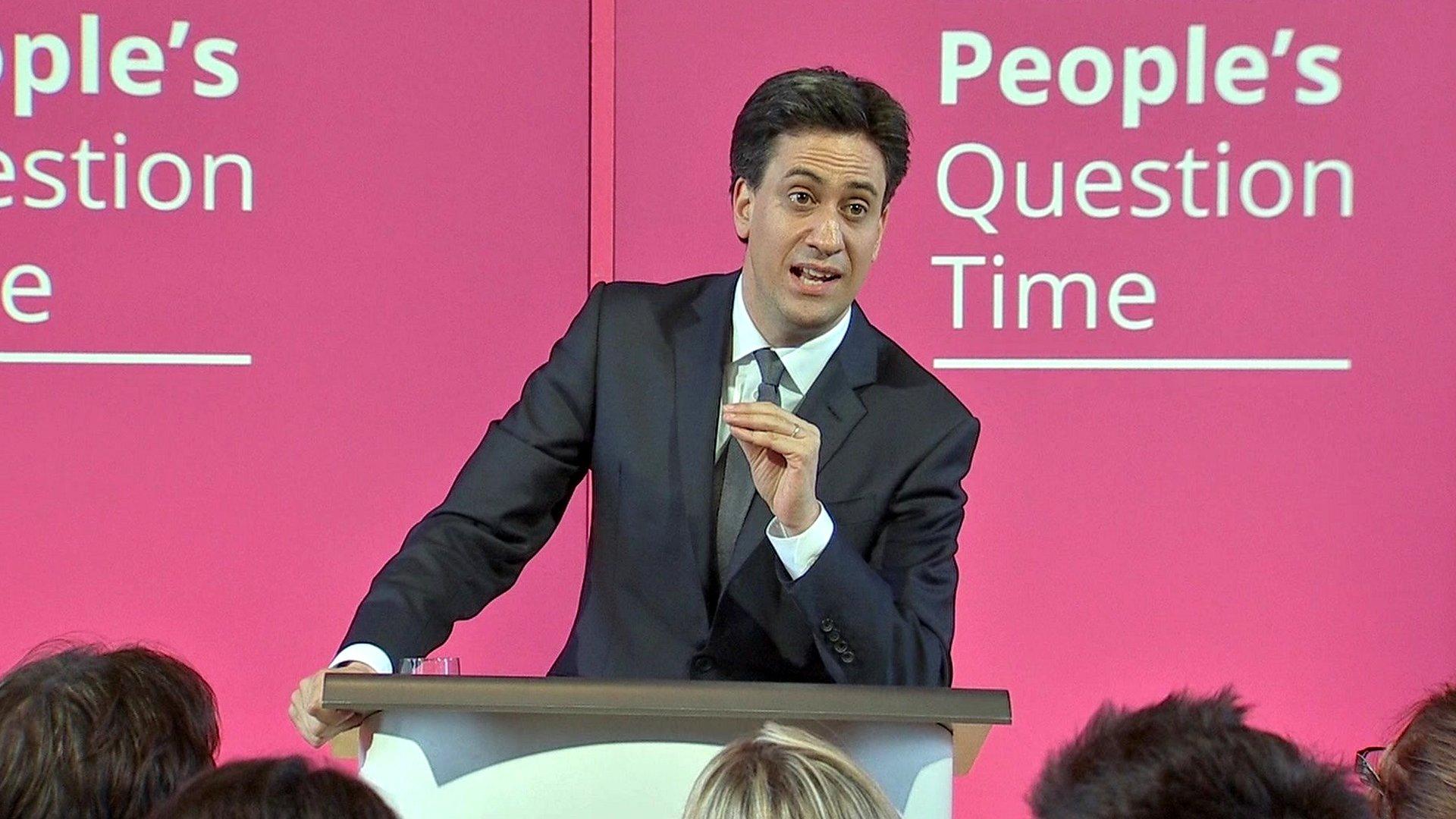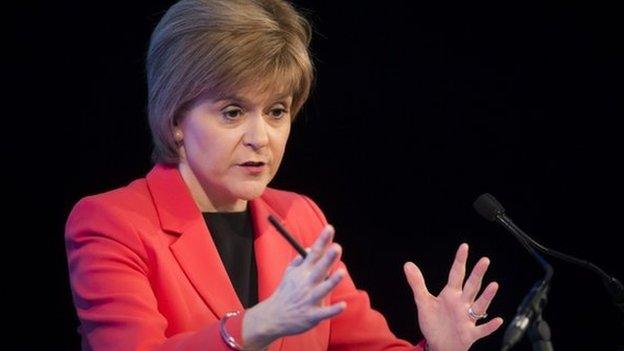Closer inspection of 'no coalition' pledges
- Published

Politics, especially during an election period, is frequently a blend of blunt speaking and rhetorical gavotte. Politicians hope that it is the blunt message, endlessly repeated, which percolates through and resides in the collective consciousness of the electorate.
But the nuances bear inspection too. Such is certainly the case with the declaration delivered by Ed Miliband that his Labour party will not enter a coalition with the SNP in the event of a hung Parliament at Westminster after May's election.
Couple of questions. Why did he not do this earlier? Because Team Labour, especially in Scotland, did not want to give any credence whatsoever to the prospect that the SNP might be potential players in coalition talks.
Their calculation was that addressing the issue of a UK governance deal - even to preclude it - acknowledged the possibility that the SNP might make sufficient gains in Scotland to gain a putative place at the bargaining table in the first place.
Totem bogey man
So why do it now? Because the Conservatives have been making apparent strides with their campaign to posit circumstances where Mr Miliband would be reliant upon SNP support to remain in power.
In particular, the Tories deployed a poster suggesting that Ed Miliband would be in Alex Salmond's pocket. The former SNP leader, note - who is seeking to return to Westminster. Not his successor as party leader and Scottish First Minister, Nicola Sturgeon. Perhaps Mr Salmond polls more significantly as totem bogey man.
Voters in England, it would appear, were disquieted by such a prospect in sufficient numbers to oblige Mr Miliband to issue a statement.
And the official reasons for the pronouncement? That the SNP refused to rule out including a commitment to a further independence referendum in their manifesto for Scottish Parliamentary elections next year.

And, further, that the SNP were out to gain full fiscal autonomy for Scotland. Which, Labour point out, would mean ending the Barnett funding formula. Which formula, say Labour, advantages Scotland.
But both these issues were extant long before today's pronouncement. Neither is new. Neither emerged over the past week. It is reasonable to presume that Mr Miliband's timing and content is driven by electoral calculation, driven by the Tory campaign. Not, of course, ignoble reasons when one is seeking votes.
So Ed Miliband rules out a coalition with the SNP - including the prospect that SNP Ministers might sit in a Labour-led UK Cabinet.
He does so on the presumption that these scenarios are disquieting to a sufficient section of English electorate - and that, consequently, tolerating the prospect might damage Labour's vote, again in England.
Wriggle room
But post-election talks might not be solely about coalition. Nicola Sturgeon has repeatedly said she does not envisage a coalition either. Talks might be about a "confidence and supply" agreement - whereby one party agrees to sustain another in office and back its budget, in return for concessions.
Why does Mr Miliband not rule that out too? Is he seeking wriggle room? Senior Labour sources say no. That it is, in practice, no deal with the SNP. They say the clearest way to express that to the public is to rule out a coalition.
They say that ruling out any talks of any nature with the SNP might simply invite sceptics to question how Labour intends to govern in a hung Parliament. With the LibDems? With the Greens? With the DUP?
So Jim Murphy, the Scottish Labour leader, sticks to the line: no coalition, no SNP Ministers. However, he says further that it would be open to the SNP to back Labour in office on…at which point he lists a series of policies which he expects to be popular with the voters such as an enhanced minimum wage.
To be clear, neither the SNP, nor Labour nor the Conservatives are pre-negotiating a coalition or its absence. Entirely understandably, this is about advancing positions now which are calculated to influence votes now, well ahead of the election.
Bargaining points
So the SNP puts forward terms for a pact with Labour - which are designed to highlight areas where the SNP believes Labour is potentially weak with the Scottish electorate right now.
And the terms? No update for Trident (Note: not scrapping it entirely, the question in the next Parliament would be the update). No austerity economics - instead, something along the lines of the "modest" spending stimulus suggested by Nicola Sturgeon. And additional powers for Scotland, beyond those in the Smith Commission.
Not, you will also note, an independence referendum. That, says Nicola Sturgeon, may or may not be in the party's manifesto for the 2016 Holyrood elections.
To repeat, these are potential bargaining points - but they are also designed to challenge Labour now, during the election campaign.
Labour returns the favour. The SNP programme, they say, involves the eventual removal of the Barnett Formula. And Labour also truncates two elections, arguing that advance for the SNP now would create momentum for independence via a further referendum.
And the Tories? Again entirely reasonably from their point of view, they are content to cause discomfort for Labour.
- Published16 March 2015

- Published16 March 2015
